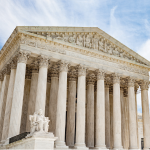Conservatives have called the law a government overreach and “socialized medicine.” Opponents repeatedly but unsuccessfully sought to repeal it in Congress and launched a series of legal challenges. In 2012, Roberts cast the deciding vote in a 5-4 decision that upheld the law on constitutional grounds, siding with the court’s four liberals.
The current case started as a long-shot legal challenge by conservative lawyers that oppose the law. Financed by a libertarian Washington group called the Competitive Enterprise Institute, the lawyers recruited four people from Virginia to be the plaintiffs. The lead plaintiff was a self-employed limousine driver named David King.
The plaintiffs said they were “deeply disappointed” with the ruling. The law “unfairly restricts the health insurance choices of millions of people, and it threatens their jobs as well,” they added.
The challengers said that the four-word phrase in the law indicates that only people who have bought insurance on state-established exchanges qualify for the tax-credit subsidies.
The Obama administration, backed by the healthcare industry, said other provisions in the law made clear that Congress intended the subsidies to be available nationwide regardless of whether states set up their own exchanges or leave the task to the federal government.
The case is King v. Burwell, U.S. Supreme Court, No. 14-114.
